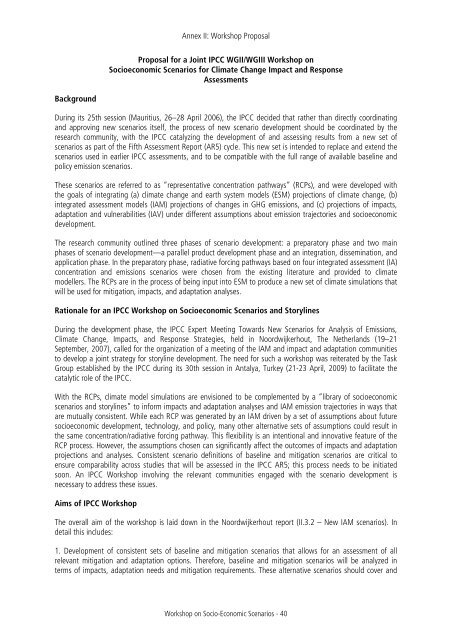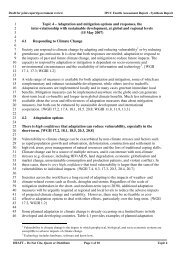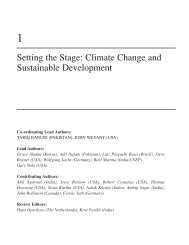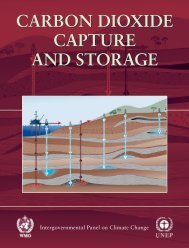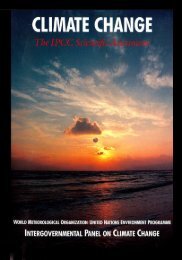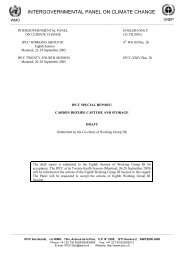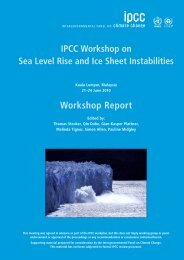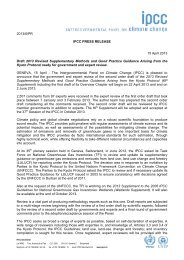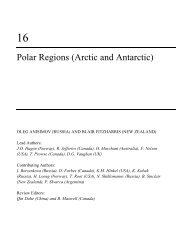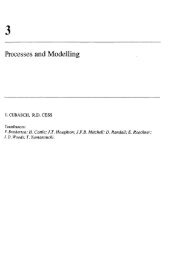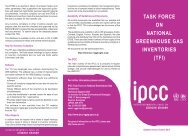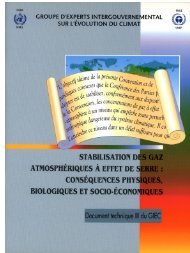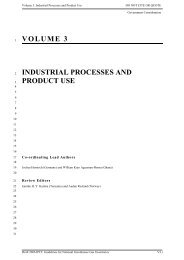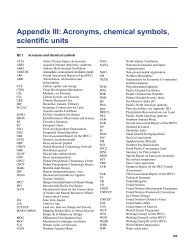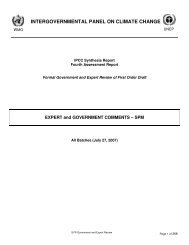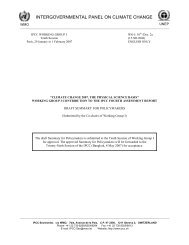Workshop Report - IPCC
Workshop Report - IPCC
Workshop Report - IPCC
You also want an ePaper? Increase the reach of your titles
YUMPU automatically turns print PDFs into web optimized ePapers that Google loves.
Annex II: <strong>Workshop</strong> Proposal<br />
Proposal for a Joint <strong>IPCC</strong> WGII/WGIII <strong>Workshop</strong> on<br />
Socioeconomic Scenarios for Climate Change Impact and Response<br />
Assessments<br />
Background<br />
During its 25th session (Mauritius, 26–28 April 2006), the <strong>IPCC</strong> decided that rather than directly coordinating<br />
and approving new scenarios itself, the process of new scenario development should be coordinated by the<br />
research community, with the <strong>IPCC</strong> catalyzing the development of and assessing results from a new set of<br />
scenarios as part of the Fifth Assessment <strong>Report</strong> (AR5) cycle. This new set is intended to replace and extend the<br />
scenarios used in earlier <strong>IPCC</strong> assessments, and to be compatible with the full range of available baseline and<br />
policy emission scenarios.<br />
These scenarios are referred to as “representative concentration pathways” (RCPs), and were developed with<br />
the goals of integrating (a) climate change and earth system models (ESM) projections of climate change, (b)<br />
integrated assessment models (IAM) projections of changes in GHG emissions, and (c) projections of impacts,<br />
adaptation and vulnerabilities (IAV) under different assumptions about emission trajectories and socioeconomic<br />
development.<br />
The research community outlined three phases of scenario development: a preparatory phase and two main<br />
phases of scenario development—a parallel product development phase and an integration, dissemination, and<br />
application phase. In the preparatory phase, radiative forcing pathways based on four integrated assessment (IA)<br />
concentration and emissions scenarios were chosen from the existing literature and provided to climate<br />
modellers. The RCPs are in the process of being input into ESM to produce a new set of climate simulations that<br />
will be used for mitigation, impacts, and adaptation analyses.<br />
Rationale for an <strong>IPCC</strong> <strong>Workshop</strong> on Socioeconomic Scenarios and Storylines<br />
During the development phase, the <strong>IPCC</strong> Expert Meeting Towards New Scenarios for Analysis of Emissions,<br />
Climate Change, Impacts, and Response Strategies, held in Noordwijkerhout, The Netherlands (19–21<br />
September, 2007), called for the organization of a meeting of the IAM and impact and adaptation communities<br />
to develop a joint strategy for storyline development. The need for such a workshop was reiterated by the Task<br />
Group established by the <strong>IPCC</strong> during its 30th session in Antalya, Turkey (21-23 April, 2009) to facilitate the<br />
catalytic role of the <strong>IPCC</strong>.<br />
With the RCPs, climate model simulations are envisioned to be complemented by a “library of socioeconomic<br />
scenarios and storylines” to inform impacts and adaptation analyses and IAM emission trajectories in ways that<br />
are mutually consistent. While each RCP was generated by an IAM driven by a set of assumptions about future<br />
socioeconomic development, technology, and policy, many other alternative sets of assumptions could result in<br />
the same concentration/radiative forcing pathway. This flexibility is an intentional and innovative feature of the<br />
RCP process. However, the assumptions chosen can significantly affect the outcomes of impacts and adaptation<br />
projections and analyses. Consistent scenario definitions of baseline and mitigation scenarios are critical to<br />
ensure comparability across studies that will be assessed in the <strong>IPCC</strong> AR5; this process needs to be initiated<br />
soon. An <strong>IPCC</strong> <strong>Workshop</strong> involving the relevant communities engaged with the scenario development is<br />
necessary to address these issues.<br />
Aims of <strong>IPCC</strong> <strong>Workshop</strong><br />
The overall aim of the workshop is laid down in the Noordwijkerhout report (II.3.2 – New IAM scenarios). In<br />
detail this includes:<br />
1. Development of consistent sets of baseline and mitigation scenarios that allows for an assessment of all<br />
relevant mitigation and adaptation options. Therefore, baseline and mitigation scenarios will be analyzed in<br />
terms of impacts, adaptation needs and mitigation requirements. These alternative scenarios should cover and<br />
<strong>Workshop</strong> on Socio-Economic Scenarios - 40


